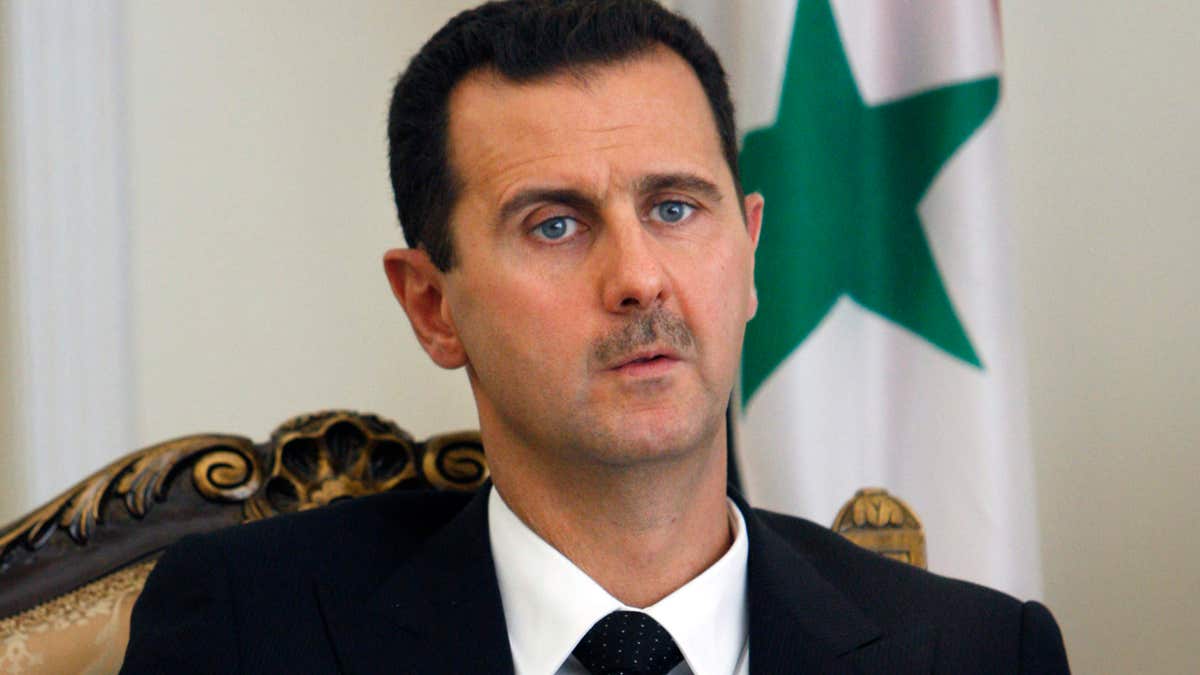
Aug. 19, 2009: This file photo shows Syrian President Bashar Assad during a meeting with his Iranian counterpart Mahmoud Ahmadinejad in Tehran, Iran. (AP)
Russia is ramping up its military help to Syria -- having sent fighter jets, troops and building a large base in Lattakia. This shows the strategic importance of not only Syria but also defending their ally President Bashir al-Assad. Indeed, when was the last time Russia send troops in a far-away foreign land in a conflict it wasn’t directly involved in? That means that Assad is not leaving anytime soon and has defied the odds once again.
Assad recently said: "My goal has never been to remain president, neither before, during, or after the crisis." Facts sadly prove the opposite each day. Assad has an amazing track record of always saving himself or being saved at the last minute, waiting for the storm to pass.
It all started ten years ago when Lebanese billionaire and former Prime Minister Rafik al-Hariri was murdered in a spectacular terror attack in Beirut.
Right away all signs pointed to Damascus’ involvement in the attack triggering the Cedar revolution that caused Syrian troops to leave Lebanon and Assad to be viewed as a pariah by the international community.
The turnaround in Western public opinion is such that now 56 percent of French people are in favor of a ground operation in Syria against Islamic State.
That is until 2008 when French president Nicolas Sarkozy made him his guest of honor at the Bastille Day parade in Paris. This French diplomatic move was not well received by the administration of President George W. Bush because both countries had been working closely on isolating Assad since 2004.
But Assad waited it out and knew quite well that a new, incoming Obama administration would be very much inclined to reach out to him. The appointment of a U.S. ambassador to Syria, after a five year vacancy, proved him right.
History should have taught the international community that engaging a regime like Assad’s rarely works; on the contrary it actually emboldens it.
That's why, when the “civil war” started in 2011, Assad faced no moral dilemma when massacring his own people.
Assad would have been history in 2012 if it were not for Iran providing a lifeline with a huge amount of cash and men through its proxy Hezbollah.
Thus, the tide turned and Assad feeling untouchable. He even used chemical weapons in August 2013 in Ghouta -- killing more than 1,400 civilians including scores of children.
This clearly crossed President Obama's “red line” but it was met by a disgraceful silence and non-action from the West.
Then, with the military advance of both the Islamic State and the Al Nusra Front, Assad found himself, again, in mid-2015 in a desperate situation.
Rumors of his demise were spreading: in May, an atmosphere of the end of the reign was spilling through Damascus. Privileged pro-Assad families were preparing to pack up anytime and leave. Also in May, Assad's militias had not been paid for 4 months, most likely due to a lack of cash.
Finally, in June even staunch ally Russia seemed to bet on Assad’s departure when it evacuated 80 of its citizens from Lattakia. But again Assad was thrown a lifeline: the nuclear deal with Iran -- which will free $150 billion -- is the cash infusion he needed, coupled with Iran’s ever growing military assistance.
Assad, like his father, is famous for playing the arsonist/fireman strategy. Thus, Assad’s assertion of "either the jihadists -- whether Islamic State or Al Qaeda -- or I" has resonated with the gullible West. Even though, just a few weeks ago, French President Hollande stated that Assad needed to be neutralized, now France has joined the U.S., Canada, Australia in striking at the Islamic State in Syria, de facto once again saving Assad.
The real tipping point for this change of heart was the refugee crisis in Europe that politicians, including Hollande and Secretary of State Kerry, the media and the public, blame wrongly, blatantly ignoring the facts, on the Islamic State rather than Assad.
The turnaround in Western public opinion is such that now 56 percent of French people are in favor of a ground operation in Syria against Islamic State.
People seem to forget that actually Islamic State and Assad have co-operated in the past especially when it sold oil to the regime.
Assad came to power as a naive ophthalmologist but quickly learned the ropes and surpassed his father as a shrewd poker player. He got both his allies and some of his enemies to save him: no small feat indeed.
